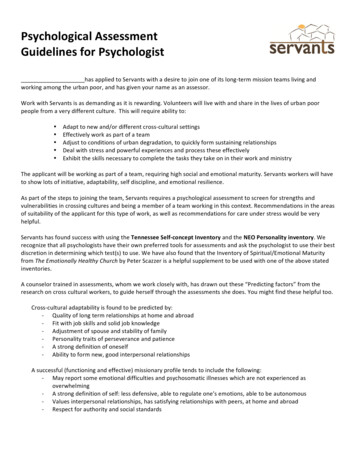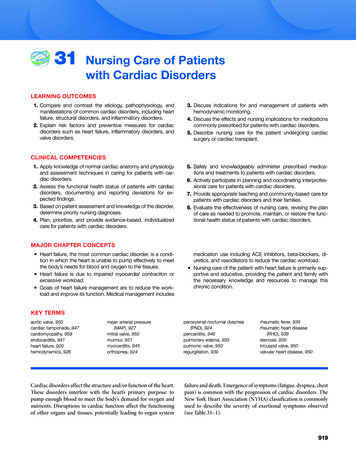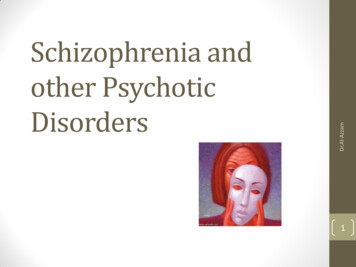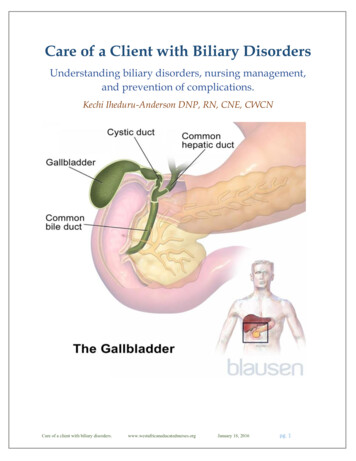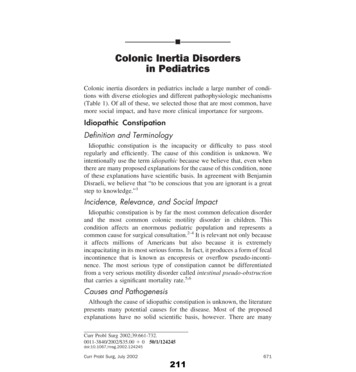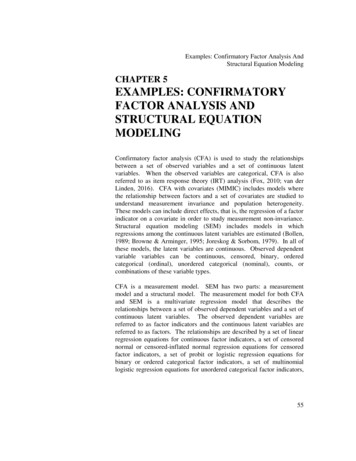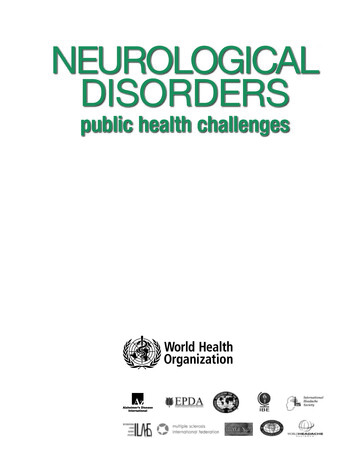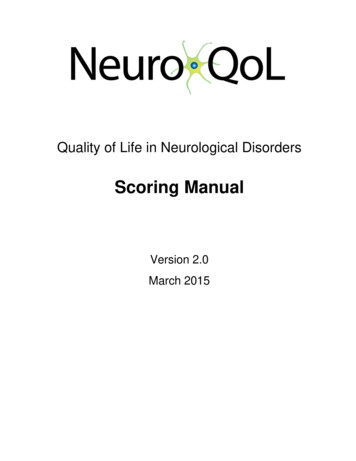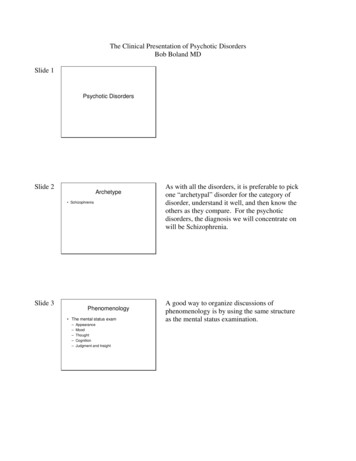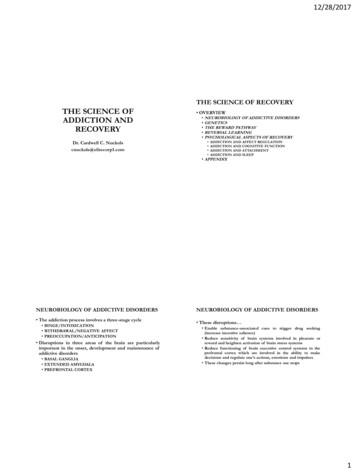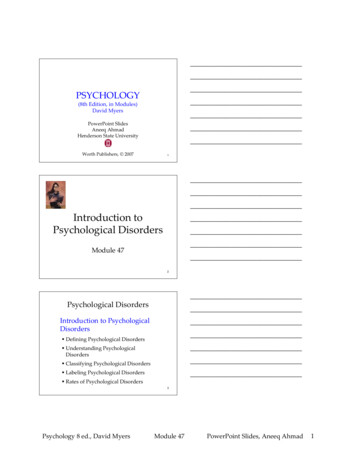
Transcription
PSYCHOLOGY(8th Edition, in Modules)David MyersPowerPoint SlidesAneeq AhmadHenderson State UniversityWorth Publishers, 20071Introduction toPsychological DisordersModule 472Psychological DisordersIntroduction to PsychologicalDisorders Defining Psychological Disorders Understanding PsychologicalDisorders Classifying Psychological Disorders Labeling Psychological Disorders Rates of Psychological Disorders3Psychology 8 ed., David MyersModule 47PowerPoint Slides, Aneeq Ahmad1
Psychological DisordersI felt the need to clean my room spent four to fivehours at it At the time I loved it but then didnʹt wantto do it any more, but could not stop The clotheshung two fingers apart I touched my bedroomwall before leaving the house I had constant anxiety I thought I might be nuts.Marc, diagnosed withobsessive‐compulsive disorder(from Summers, 1996)4Psychological DisordersPeople are fascinated by the exceptional, theunusual, the abnormal. This fascination can bedue to two reasons:1.During various moments we feel, think and act likean abnormal individual.2.Psychological disorders may bring unexplainedphysical symptoms, irrational fears, and suicidalthoughts.5Psychological DisordersTo study the abnormal is the best way ofunderstanding the normal.William James (1842‐1910)1.There are 450 million people suffering frompsychological disorders (WHO, 2004).2.Depression and schizophrenia exist in all culturesof the world.6Psychology 8 ed., David MyersModule 47PowerPoint Slides, Aneeq Ahmad2
OBJECTIVE 47‐1 Identify criteria for judgingDefining Psychological Disorderswhether behavior is psychologicallydisordered.Mental health workers view psychologicaldisorders as persistently harmful thoughts,feelings and action.When behavior is deviant, distressful, anddysfunctional psychiatrists and psychologistslabel it as disordered (Comer, 2004).7Deviant, Distressful & DysfunctionalCarol Beckwith1. Deviant behavior(going naked) in oneculture may beconsidered normalwhile in others leads toarrest.2. Deviant behavior mustaccompany distress.3. If a behavior isdysfunctional it isclearly a disorder.In Wodaabe tribe men wearcostumes to attract women.In Western society thiswould be consideredabnormal.8OBJECTIVE 47‐2 Contrast the medical modelUnderstanding PsychologicalDisordersof psychological disorders with thebiopsychosocial perspective on disorderedAncient Treatments of psychological disordersinclude trephination, exorcism, being caged likeanimals, beaten, burned, castrated, mutilated,and transfused with animal’s blood.behavior.John W. VeranoTrephination (boring holes in the skull to remove evil forces)Psychology 8 ed., David Myers9Module 47PowerPoint Slides, Aneeq Ahmad3
Medical PerspectivePhilippe Pinel (1745‐1826) from France, insistedthat madness was not due to demonic possessionbut an ailment of the mind.George Wesley Bellows, Dancer in a Madhouse, 1907. 1997 The Art Institute of Chicago10Dance in the madhouse.Medical ModelWhen physicians discovered that syphilis led tomental disorders, the medical model startedlooking at physical causes of these disorders.1.2.3.4.Etiology: Causation and development of thedisorder.Diagnosis: Identifying (symptoms) anddistinguishing one disease from another.Treatment: Treating a disorder in a psychiatrichospital.Prognosis: Forecast about the disorder.11Biopsychosocial PerspectiveAssumes that biological, socio‐cultural, andpsychological factors combine and interact toproduce psychological disorders.12Psychology 8 ed., David MyersModule 47PowerPoint Slides, Aneeq Ahmad4
OBJECTIVE 47‐3 Describe the goals andClassifying Psychological Disorderscontent of the DSM‐IV‐TR.American Psychiatric Association rendered aDiagnostic and Statistical Manual of MentalDisorders (DSM) to describe psychologicaldisorders.Most recent edition, DSM‐IV‐TR (Text Revision,2000) describe 400 psychological disorderscompared to 60 in the 1950s.13Multiaxial ClassificationIs a Clinical Syndrome (cognitive, anxiety,mood disorders [16 syndromes]) present?Is a Personality Disorder or Mental Retardationpresent?Axis IIIIs a General Medical Condition (diabetes,hypertension or arthritis etc) also present?Axis IVAre Psychosocial or Environmental Problems(school or housing issues) also present?Axis IAxis IIWhat is the Global Assessment of the person’sAxis V functioning?14Multiaxial ClassificationNote 16 syndromes in Axis I15Psychology 8 ed., David MyersModule 47PowerPoint Slides, Aneeq Ahmad5
Multiaxial ClassificationNote Global Assessment for Axis V16Goals of DSM1.2.Describe (400) disorders.Indicate how prevalent the disorderis.Disorders outlined by DSM‐IV‐TR are reliablethus diagnosis by different professional aresimilar.Others criticize DSM‐IV‐TR for “putting anykind of behavior within the compass ofpsychiatry.”17OBJECTIVE 47‐4 Discuss the potentialLabeling Psychological Disordersdangers and benefits of using diagnosticlabels.1. Critics of the DSM‐IV‐TR argue that labelscan stigmatize individuals.Elizabeth Eckert, Middletown, NY. From L. Gamwell andN. Tomes, Madness in America, 1995. Cornell University Press.Asylum baseball team (labeling)Psychology 8 ed., David Myers18Module 47PowerPoint Slides, Aneeq Ahmad6
Labeling Psychological Disorders2. Labels can be helpful for health careprofessionals, communicating with oneanother and establishing therapy.19Labeling Psychological Disorders3. “Insanity” labelsraise moral andethical questionsabout how societyshould treat peoplewho havedisorders and havecommitted crimes.Elaine Thompson/ AP PhotoTheodore Kaczynski(Unabomber)20OBJECTIVE 47‐5 Discuss the prevalence ofRates of Psychological Disorderspsychological disorders, and summarize thefindings on the link between poverty andserious psychological disorders.21Psychology 8 ed., David MyersModule 47PowerPoint Slides, Aneeq Ahmad7
Rates of Psychological DisordersPrevalence of psychological disorders duringprevious year (WHO, 2004).22Risk and Protective FactorsRisk and protective factors for mental disorders(WHO, 2004).23Risk and Protective Factors24Psychology 8 ed., David MyersModule 47PowerPoint Slides, Aneeq Ahmad8
Psychology 8 ed., David Myers Module 47 PowerPoint Slides, Aneeq Ahmad 4 10 Medical Perspective Philippe Pinel (1745‐1826) from France, insisted that madness was not due to demonic poss
